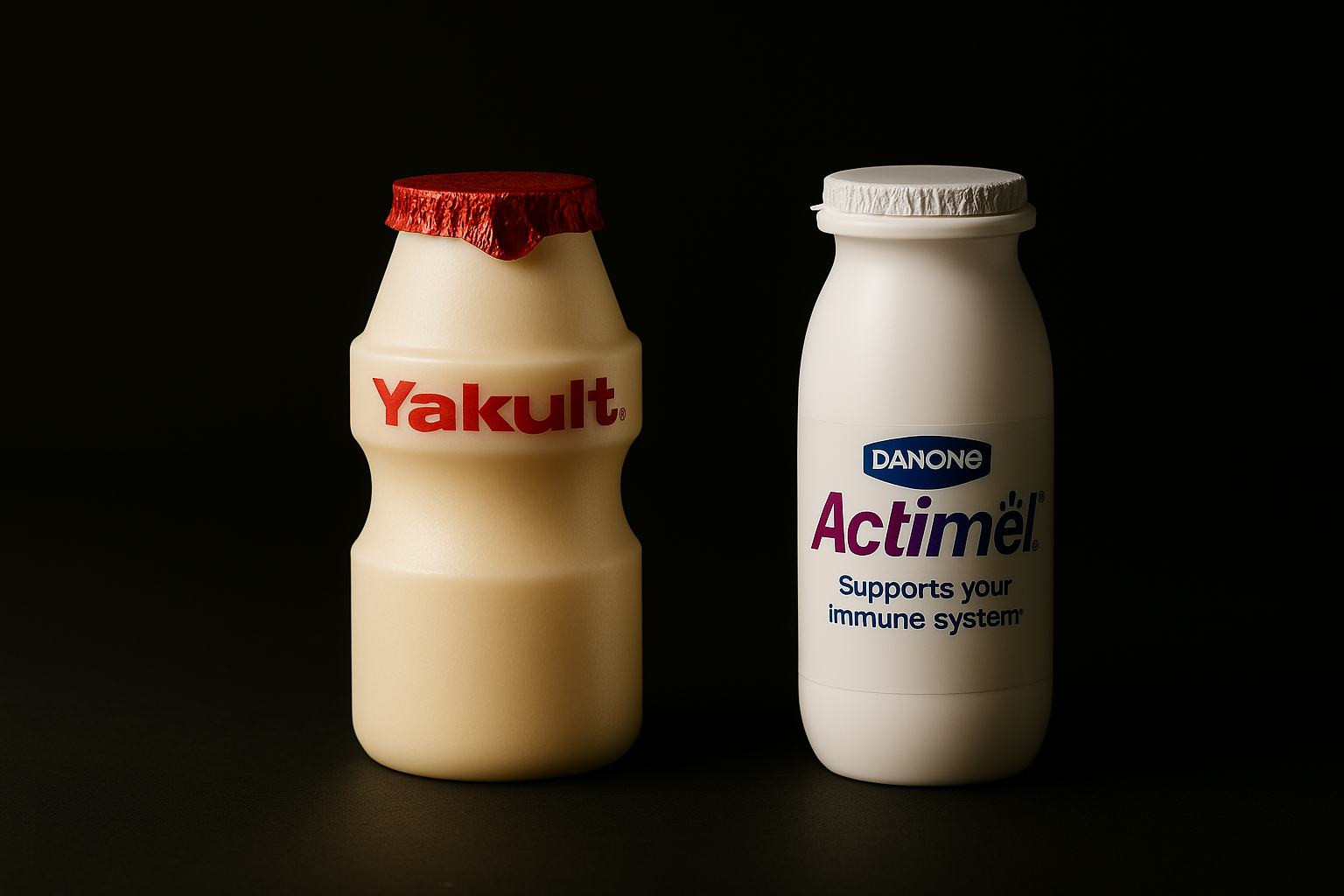Actimel vs Yakult: Which Probiotic Drink Is Best for Your Gut?
Probiotics are everywhere now — especially in drink form — but two brands dominate the UK shelves: Actimel and Yakult. But how do they compare? And is one better for your gut health?
Let’s break it down.
What Are Probiotic Drinks?
Probiotic drinks are dairy-based beverages that contain live, beneficial bacteria (probiotics). These bacteria help balance your gut microbiome — the trillions of microbes that affect digestion, immunity, skin, and even mood.
The idea is simple: drink a daily shot, and you give your gut a regular boost of “good” bacteria.
👇 Want to learn more about how probiotics work?
Read: Prebiotics and Probiotics – The Gut Health Duo
Actimel: What’s Inside?
Actimel, made by Danone, is a creamy fermented yoghurt drink with added Lactobacillus casei Danone (L. casei DN-114 001) — a well-studied strain of good bacteria.
Each Actimel bottle contains:
- Lactobacillus casei Danone
- Lactobacillus bulgaricus
- Streptococcus thermophilus
- ~10 billion live cultures
- Added vitamins D and B6 for immune support
- Dairy-based (contains milk and lactose)
It’s smooth, widely available, and comes in fruity flavours like strawberry, mango, and blueberry.
Yakult: What’s Inside?
Yakult is Japan’s original probiotic drink and contains a single strain: Lactobacillus casei Shirota, named after the scientist who developed it in 1935.
Each 65ml bottle of Yakult includes:
- 6.5 billion L. casei Shirota
- Sugar (Yakult Original) or sweetener (Yakult Light)
- No added vitamins
- Dairy-based
Yakult is smaller than Actimel and has a thinner, tangier taste.
Key Differences Between Actimel and Yakult
| Feature | Actimel | Yakult |
|---|---|---|
| Strains | 3 strains | 1 strain |
| Bacteria Count | ~10 billion | 6.5 billion |
| Added Nutrients | Vitamin D, B6 | None |
| Taste | Creamy, fruity | Tangy, thinner |
| Volume | 100ml | 65ml |
| Sugar Content | Moderate | Higher (Original Yakult) |
| Variants | Lactose-free available | Original / Light only |
Which One Is Better for Gut Health?
Both drinks deliver live probiotics, which can help with:
- Digestion
- Immune support
- Gut balance after antibiotics
- Mood and mental clarity
However, Actimel may have an edge with its higher bacteria count, added nutrients, and variety of flavours.
That said, Yakult‘s unique L. casei Shirota strain is clinically proven to survive digestion and reach the gut alive — and has a longer history of clinical research.
Our Verdict: Actimel vs Yakult
If you’re after a probiotic drink with a smoother taste, added vitamins, and more strain diversity — Actimel might suit you better.
If you prefer a simple, tangy probiotic with a trusted legacy and minimal ingredients — Yakult is a strong choice.
The best option? Try both and see which your gut likes better.
Bonus Tip: Do You Need Probiotic Drinks at All?
Probiotic drinks are a convenient way to boost gut health — but they’re not the only way.
You might benefit more from a multi-strain probiotic supplement paired with a gut-friendly diet. These usually contain more strains, no sugar, and no dairy.
🧠 Learn more about the best probiotic and prebiotic supplements in the UK
🕒 How Often Should You Take Probiotic Drinks?
Most people benefit from taking probiotic drinks daily, especially when trying to support gut health long term. The key is consistency — beneficial bacteria don’t stick around forever, so regular intake helps maintain balance in your microbiome.
It’s also worth noting that benefits can take time. You might not notice big changes overnight, but after 1–2 weeks, some people report improvements in digestion, bloating, and energy. For others, it may take a little longer depending on their gut’s starting point.
👉 If you’re on antibiotics, starting probiotic drinks (or capsules) immediately after your course may help restore healthy gut flora faster.
Are They NHS-Recommended?
While the NHS does not recommend specific brands, it acknowledges that probiotics may help with digestive issues like IBS, especially after a course of antibiotics. NHS probiotics advice

👉 Like this article? Share it on Facebook 💬
➡️ Join our private Facebook group here! [Join Now]

Leave a Reply